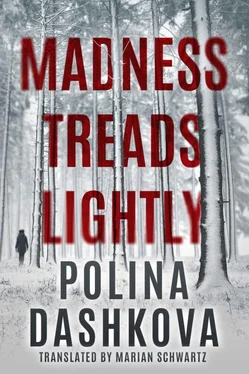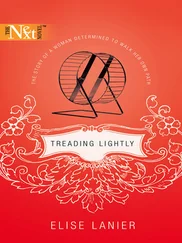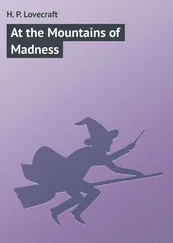Her short, strong fingers slid slowly and gently over his smooth-shaven cheek. Her nails were polished a matte red, which looked garish against his very pale cheek. While continuing to speak quiet, lulling words, the woman was thinking that she mustn’t forget to remove this polish tonight and use something more muted, more elegant.
The man shut his eyes. His nostrils flared slowly and rhythmically. His breathing was deep and calm. When the woman felt his face muscles relax, she turned on the engine, and the dark blue Volvo slowly left the courtyard, came out into the side street, and from there onto the main road, where it got lost in the crowd of cars speeding under the slow, wet snow.
Olga Sinitsyna had been Lena Polyanskaya’s best friend all five of their years together in the journalism department at the university. Afterward they lost track of each other and only reconnected eight years after graduation, totally by accident, on a plane.
Lena was flying to New York. Columbia University had invited her to lecture on modern Russian literature and journalism. In the smoking section, an elegant, well-groomed businesswoman wearing an austere and expensive suit sat down next to her.
It was 1990, and businesswomen like that were still a rarity in Russia. Lena took a quick glance at her and was amazed that a rich American was flying Aeroflot rather than Pan Am or Delta. But right then the woman sadly shook her light blond head and said in Russian, “You take the cake, Polyanskaya! I keep waiting to see whether you’ll recognize me.”
“Olga! Olga Sinitsyna!” Lena was ecstatic.
It seemed incredible that a successful businesswoman would hatch from that ephemeral, sublime creature she always remembered in jeans and a sweater. Olga had been a typical smart Moscow girl of the late 1970s who could argue all night long over Russia’s fate and sacrificial mission and the vicissitudes of existential consciousness and then stand in line for hours, not for boots at the department store, but for the basement exhibit hall on Malaya Gruzinskaya Street or for tickets to a Richter concert at the Conservatory.
Olga Sinitsyna, known all over the journalism department for being scatterbrained and impractical and for her absurd, ill-fated love affairs, and this cool woman with the sparkling American smile, so self-assured, seemed like beings from different planets.
“In the end,” Olga told her, “I was left on my own with two little boys a year apart. I did marry Givi Kiladze, you know. Remember him?”
Givi Kiladze had studied journalism with them and was—unrequitedly—in love with Olga all five years. A Muscovite whose family had come from Georgia two generations before, he only remembered his native language when he wanted to slit someone’s throat. As a rule, the only people whose throats he wanted to slit were Olga or anyone who dared get closer to her than three meters.
“Passion ends quickly. Our life went bad, and we were practically starving. Givi couldn’t find a job and started drinking and dragging hordes of tramps into our home, after which the towels and teaspoons would disappear. Everyone had to be fed and given a place to sleep. He has a generous soul, and there I was with a belly and toxicosis. When little Gleb was born, he sent for his great-aunt to come from their mountain village and help me. His great-aunt was followed by his great-uncle and then another uncle and another aunt. Eventually, I grabbed Gleb and fled to my parents’. That’s when the drama started. Amateur drama: ‘I’ll kill myself! I’ll kill you!’ Basically, we made our peace. At the time I firmly believed a child needs his father, even if he’s crazy.
“My Gleb has dark hair and eyes, but my younger, Gosha, was born blond and blue-eyed. That idiot started howling that Gosha wasn’t his son. You know what I did to keep my sanity? Started learning Japanese! Picture this: a nursing mama with an infant at her breast loudly reading Japanese characters while the father of her children runs around with a dagger shouting, ‘I’ll murder you!’ while Gleb, at two and a half, is sitting on the potty and saying in Georgian, ‘Papa, don’t kill Mama, she’s good!’ It was his mountain relatives who eventually set him straight.
“Meanwhile, there wasn’t so much as a coin in the house. We lived on what my parents gave us. They couldn’t give us a lot but they gave us everything they had. Packages would come from the mountains, too—homemade wine, figs, nuts. Basically, I went back to my parents again—took the kids and left. For good. Givi would show up in the middle of the night, drunk as a skunk. It’s a good thing Mitya was there and could step in. Otherwise Givi would have killed me without batting an eye. He was jealous, even of my own brother.”
“You could have called.” Lena sighed. “Why did you totally vanish?”
“What about you?” Olga grinned. “Why did you?”
“Things happened.” Lena shrugged. “I have my own skeletons in my closet. Did you learn Japanese after all?”
“Did I ever! You know, I’m actually grateful to Givi. If he hadn’t driven me to Japanese, I wouldn’t be the manager of the Russian branch of Kokusai Koeki. I started translating the manuals for the computers and office equipment they sell without having the foggiest idea what they were. But I had to feed my children, and mama and papa, and my grandmother, and Mitya. My little brother—he’s still a deadbeat—writing all his songs and playing his guitar, and not doing anything he doesn’t want to do. But he does like to eat.
“So I had to earn the money, and I turned out to be pretty good at it. I got hooked on it and pretty quickly started earning a lot. Mama and Grandma stayed with the children while I built my career. I’ll be senior manager soon, then deputy director, and then the sky’s the limit. Everything’s great now. I’m making tons of money, and sometimes I look in the mirror and see this woman I don’t recognize. Remember the poems I used to write? And my paper on Kafka? That was when I used my brain, whereas now… No, of course, I use my brain now, too, but sometimes I get the feeling that instead of a brain, there’s a computer in this crock of mine spitting out decisions.”
“Come off it, Sinitsyna.” Lena started laughing. “Everything’s going great for you, and not just kind of, but for real. The Kafka and the poetry, they’re still in there, they didn’t go anywhere; it’s just your youth that’s passed. There’s a time for everything.”
“But your youth hasn’t passed,” Olga said, looking into Lena’s big, smoky-gray eyes and her skinny, makeup-free face. “Polyanskaya, you look exactly the way you did in our first year.”
“Stop it!” Lena shook her head. “I’m just skinny, so I look younger. Also, business suits and makeup are by no means required in my work. I am in journalism, so I can get away with the same old jeans and sweaters. Your position requires more of you, you’re our businesswoman.”
Six years had passed since that meeting on the plane. Olga had become deputy commercial director for the Russian branch of Kokusai Koeki. Lena ran the literature and art department at the joint Russian-American magazine Smart , and two years ago she’d gotten married and given birth to a daughter, Liza. But Olga Sinitsyna hadn’t remarried. She was disillusioned from her first experience of family life. She spent the crumbs of free time she had left after work on her sons and younger brother.
For those six years, Lena and Olga stayed in touch, calling each other and getting together fairly often. Each realized that the older you get, the harder it is to make new friends. You have to treasure your old ones. You have to have someone you can call at any time, day or night, someone who’ll be glad to hear from you. Someone who remembers you young, carefree, and defenseless. And when you’re together, you too can remember what that felt like, if only for a few minutes.
Читать дальше













